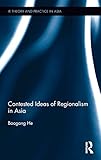Contested ideas of regionalism in Asia / [Book] Baogang He.
Material type: TextSeries: IR theory and practice in AsiaDescription: 200 pages : 24 cmISBN:
TextSeries: IR theory and practice in AsiaDescription: 200 pages : 24 cmISBN: - 9781138651678 (hardback)
- 320.54095 23
- 320.54095
| Item type | Current library | Call number | Status | Date due | Barcode | Item holds |
|---|---|---|---|---|---|---|
 Books
Books
|
Junaid Zaidi Library, COMSATS University Islamabad Ground Floor | 320.54095 HEB-C (Browse shelf(Opens below)) | Available | 55799 |
"Deepening regionalism in Asia demands new leadership. Strong elites who are committed to a supranational identity are a minimum requirement of successful regionalism. Regional leaders are increasingly seen as a new set of leaders in Europe. Currently, Asian regional leaders largely come from the diplomacy community, or trade and economic sectors. Yet further regionalization demands a new type of leadership from civil society and citizens. In this context it is important to cultivate new regional leadership through the development of regional citizenship. This book examines contested ideas of regionalism in Asia with a particular focus on two competing ideas of pan-Asianism and Pacificism. It also identifies a new trend and contestation, the fundamental shift from a civilization understanding of regionalism to a technocratic and functional understanding of regionalism in the form of regulatory regionalism. It also examines the other contested imaginations of regionalism in Asia including elitist versus participatory approaches to regionalism, and democracy-centric versus nationalism-centric approaches to regionalism"-- Provided by publisher.
All.


There are no comments on this title.